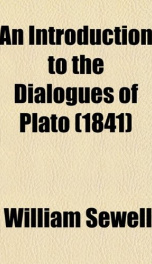an introduction to the dialogues of plato

Purchase of this book includes free trial access to www.million-books.com where you can read more than a million books for free. This is an OCR edition with typos. Excerpt from book: CHAPTER IV. Under the preceding view every part of Plato's system will fall naturally into place. Even questions apparently fatthest from any practical intention are thus connected with his plan. If in the Sophist he indulges in the most subtle analysis of our notion of being, it is to overthrow the fundamental fallacy of that metaphysical school which was denying all virtue by confounding all truth, and thus poisoning human nature at its source, and justifying the grossest crimes both of the State, and of its leaders 1. If he returns again and again to his noble theory of Ideas, it is to fix certain immutable distinctions of right and wrong, good and evil; and to raise up the mind to the contemplation of a Being of perfect goodness, prior in existence, superior in power, unamenable, in his independence, to those fancies and passions of mankind, which had become, before the eyes of Plato, in individuals, unbridled lusts, and in the State, an insanity of tyranny. If in the Parmenides he takes us into the abstmsest mysteries of metaphysics, the nature of unity and numberthis also was rendered necessary, not only to obviate objections to his own theory of ideas, but to fix the great doctrine of unity in a Divine Beingunity in goodnessone truth in action and thought,as opposed to that polytheism of rea- . son which makes every man's conscience his god. It grappled also with a mystery, which meets us at the foundation of every deep theory, and in the forms of every popular belief, in Christianity as well as in 1 Gorgias, 1. heathenism ; a mystery, which, true in itself as wholly distinct from man, has yet a corresponding mystery in the constitution of the human mind-and which compelled even the heathen philosopher to state the same seeming paradox for the very foundation ...
Users who have this book
Users who want this book
What readers are saying
What do you think? Write your own comment on this book!
write a commentGenre
if you like an introduction to the dialogues of plato try:
Do you want to read a book that interests you? It’s EASY!
Create an account and send a request for reading to other users on the Webpage of the book!


